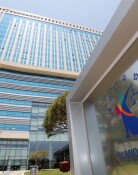KORUS FTA Makes Sense in Terms of Security Says Expert
KORUS FTA Makes Sense in Terms of Security Says Expert
Posted April. 05, 2007 08:02,
Jagdish Bhagwati, a highly regarded economist and free trade advocator, a professor of Economics and Law at Columbia University, and frequently mentioned candidate for the position of WTO secretary general, retorted an argument that Korea-US Free Trade Agreement would reduce jobs and worsen working conditions and insisted that, Free trade builds social and economic wealth
In an e-mail interview with this newspaper after the FTA was signed, he pointed out that free trade and investment liberalization have played a pivotal role in eradicating poverty in countries like China and India. Also, he said that as free trade systems have established, multinational companies have made more investment in developing nations; as a result, the number of people living below the poverty line in the world dropped by 500 million between 1976 and 1998.
He is famous for disputing globalizations pros and cons with Joseph E. Stiglitz, who teaches at Columbia University as well. He has criticized opponents of globalization like Joseph E. Stiglitz for being obsessed with Jurassic Park economics, in which they struggle in vain to save dinosaurs on the assumption that we killed dinosaurs.
He emphasized that developing nations like Korea achieved economic growth through market opening and free trade, and thus developing nations should open their economies.
He also added that an open economy is a system that benefits both rich and poor nations alike, and locking that door citing social polarization, worsened working conditions, and environmental issues would do no good to anyone. Moreover, he said that social problems that could arise in the process of implementing a free trade system should be addressed through effective cooperation between governments and NGOs.
However, he expressed deep concerns over the fact that a free trade system has been implemented in the form of bilateral trade agreements rather than WTO multilateral trade rounds.
He says that FTAs driven by the U.S. and the EU concentrate on expanding regionalism rather than multilateralism, and therefore could undermine free trade. Therefore, he said, FTAs should be called Preferential Trade Agreements rather than free trade agreement, because FTAs exclude third-party nations.
He added that the number of two-way trade pacts signed as of last year exceeded 400. Also, he mentioned that bilateral agreements increase trade and investment, but can worsen trade environments because the content of those pacts is different country by country. He named the phenomenon regarding different content of agreements that increase trade costs as the Spaghetti bowl effect.
He also pointed out that a Korea-U.S. FTA makes more sense in terms of resolving the North Korean nuclear issue and establishing peace on the Korean peninsula than boosting Koreas economy. The reason why the U.S. has recently turned from South America to Asia to conclude an FTA is that this region is very important geopolitically, he added.
Yet, he said that it is clear that the free trade system leads to spreading democracy and increasing the size of the middle class by expanding the pie of a countrys national economy. And he said that in Mexico, there was strong opposition to the influence of the U.S. in the past, but since concluding an FTA with the U.S., such criticism has almost disappeared.
mickey@donga.com







